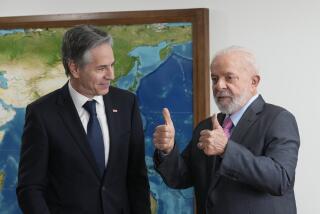U.S. Rejects Debtor-Nation Relief Plans
- Share via
WASHINGTON — The Reagan Administration has decided to make no concessions to debt-relief proposals submitted by developing countries to international lending organizations Tuesday, a senior Treasury Department official said.
As the International Monetary Fund and the World Bank hold their semiannual meeting here this week, creditor and debtor nations apparently remain far apart.
In making their proposals, ministers from a group of 24 developing countries said that “lowering of the United States fiscal deficits and interest rates is an urgent requirement” for world economic stability. They argued that the uneven growth of the world economy last year, led by the United States, is “unstable and unsustainable.”
However, in meetings today and Thursday with the steering committees of the lending organizations, Treasury Secretary James A. Baker III is expected to propose only one new idea: Administration support for an investment insurance plan, administered by the World Bank, which would encourage private investments in developing countries.
Opposed to Demands
David Mulford, assistant Treasury secretary for international affairs, said the United States remains opposed to demands repeated Tuesday by the debtor countries, among them:
- A 50% increase in the capital of the World Bank, which loaned $13 billion to developing countries last year.
- An increased authorization for the IMF to issue its members the equivalent of about $17 billion a year.
- A new loan fund, administered by the IMF, to help debtors pay high interest rates, as they once received loans to pay soaring oil prices.
The Group of 24, representing developing countries from Africa, Asia and Latin America, issued an extensive document that contains a pessimistic view of the world economic condition, as well as a long list of proposals on trade, financial flows, debt servicing and private investment.
The group is under the chairmanship of Argentine Economy Minister Juan Sourrouille. Argentina, one of the largest debtor countries, is facing serious difficulties with the IMF because it has failed to meet targets limiting inflation, public deficits and credit expansion.
Sourrouille said at a press conference that the IMF austerity requirements, which are the basis for debt refinancing by international banks, had to be linked to expanded exports by debtor countries, which have encountered increasing protectionism in industrial countries.
Meanwhile, the Washington Post reported from Peru that Alan Garcia, the overwhelming winner in first-round presidential elections Sunday, said that his government would bypass negotiations with the IMF on its foreign debt “so as to address our creditors directly.”
Before extending terms on their huge loans to Latin American countries, banks have required that the debtor countries reach agreements with the IMF on economic reform programs. If Peru did not accept an IMF program, it could provoke a confrontation with its creditors leading to the suspension of all credit or even a formal default on its outstanding loans, financial sources in Lima told the Post.
Such an action by Peru would be closely watched in Argentina and Brazil, which have nearly $150 billion in outstanding loans and are currently trying to reach new agreements with the IMF.
More to Read
Sign up for Essential California
The most important California stories and recommendations in your inbox every morning.
You may occasionally receive promotional content from the Los Angeles Times.










